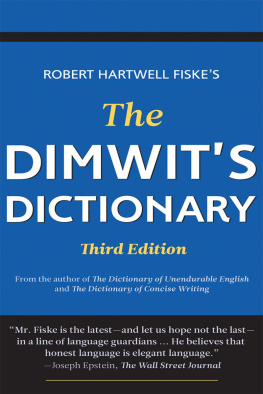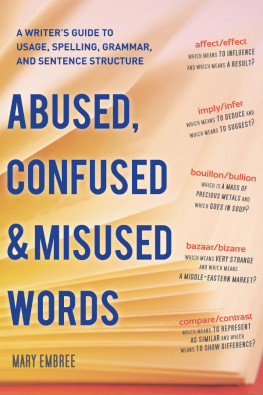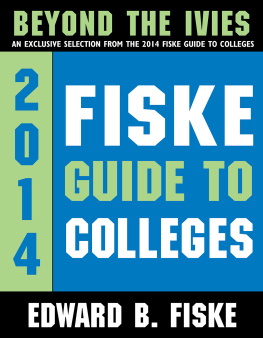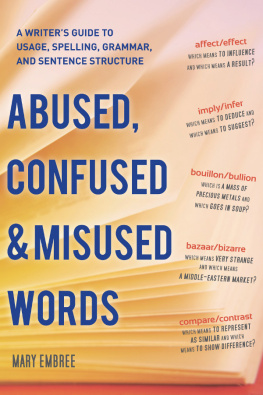Thank you for purchasing this Scribner eBook.
Sign up for our newsletter and receive special offers, access to bonus content, and info on the latest new releases and other great eBooks from Atria Books and Scribner.

or visit us online to sign up at
eBookNews.SimonandSchuster.com


ALSO BY ROBERT HARTWELL FISKE
The Dictionary of Concise Writing
The Dimwits Dictionary
The Best Words


SCRIBNER
A Division of Simon & Schuster, Inc.
1230 Avenue of the Americas
New York, NY 10020
www.SimonandSchuster.com
Copyright 2011 by Robert Hartwell Fiske
Robert Hartwell Fiskes Dictionary of Unendurable English was
previously published as The Dictionary of Disagreeable English
(Writers Digest Books, 2004) and has been updated, revised,
enlarged, and redesigned.
All rights reserved, including the right to reproduce this book or
portions thereof in any form whatsoever. For information address
Scribner Subsidiary Rights Department,
1230 Avenue of the Americas, New York, NY 10020.
First Scribner edition November 2011
SCRIBNER and design are registered trademarks of The Gale Group, Inc.,
used under license by Simon & Schuster, Inc., the publisher of this work.
The Simon & Schuster Speakers Bureau can bring authors to
your live event. For more information or to book an event contact
the Simon & Schuster Speakers Bureau at 1-866-248-3049 or
visit our website at www.simonspeakers.com .
Manufactured in the United States of America
1 3 5 7 9 10 8 6 4 2
ISBN 978-1-4516-5131-7
ISBN 978-1-4516-5132-4 (pbk)
ISBN 978-1-4516-5134-8 (ebook)
Contents

First Foreword

by John Simon
T here used to be various ways of telling whether a person was of discriminating taste, good breeding, refined sensibility. You could recognize gentility by clothes, hairdos, table manners; by the sports, films, and foods someone preferred. Regrettably, our great democratic society, so worthy and desirable in many ways, has become such a leveler that most of these fine distinctions have been eroded, as if giving your bus seat to someone older, wearing a necktie, covering your mouth when yawning or sneezing, and speaking and writing correctly were signs of snobbish, undemocratic elitism. Being well groomed, well dressed, and well behaved have become obsolete, if not indeed politically incorrect.
Yet do we not want to distinguish ourselves, make good impressions, rise above the lowest common denominator? Is there no form of excellence left untarnished, unridiculed, unrememberedor, conversely, available to any boor who can afford designer clothes, four-star restaurants, or a trophy wife? One sure way remains for fastidiousness to shine forth without undue ostentation in the most ordinary, everyday situations; it is, you may have guessed it, language.
No damsel was ever in more distress, no dray horse more flogged, no defenseless child more drunkenly abused than the English language today. And do not assume that it is attacked only from below, by what used to be called the great unwashed when looking washed was still held to be desirable. Given the sorry state of our education, the catastrophic neglect of book reading on all social levels, and the overwhelming indifference to all but material advancement and worldly success, no wonder that language gets it in the groin from all sides, not least from above. Above includes a variety of evils, from individuals who attended the best of schools and, whether through their own or their teachers fault, learned nothing, to professional linguists of the descriptive or permissive persuasion, who find it more popular and remunerative to accept every change, however dumbing down and obfuscatory, they can lay their tape recorders on. Indeed, by endorsing it, they prove themselves edgy, with it, democratic, rather than courting unpopularity by being thought snobbish, pedantic, or, perish the thought, academic. As if many academics werent the first to embrace mindless trendiness.
The fallacious but crowd-pleasing argument is that it is the people who use it that make a language, not the wizened fuddy-duddies who desperately cling to antiquated niceties such as holding a door open for a lady, crossing the street on a green light, and knowing the difference between between you and I and between you and me. It is not just a matter of convention and prudence; it is an aesthetic and moral choice. Rules of correctness are not some highbrow conspiracy; they strengthen the social fabric by making social intercourse more gracious, more efficient, and more satisfying.
Dictionaries, usually compiled by permissivistswhich is to say copycats, cynics, lickspittles, or opportunistsare, by and large, no longer reliable guides, even when they arent downright ignorant, as the Dictionary of Unendurable English shows them to be. There is no evidence that Robert Hartwell Fiske is against reasonable change, that he hangs on by his fingernails to keep himself from falling into a split infinitive. But he adheres admirably to rules that are practical, that facilitate understanding through logic and lucidity, or even just by a sense of decorum that make speech more communicative and writing more elegant. Most people will understand from the context that you meant imply even though you barbarously said infer. Multitudes, but not Mr. Fiske, will stand by, ignorant and unshuddering, when newscasters and celebrities, preachers and politicians, say People were laying in the streets, and will comprehend, as Mr. Fiske will, too, that a mass orgy is not what was meant. But isnt there something deeply satisfying, to speaker and hearer alike, when a person uses prone or comprise correctly, when a judge is said to be disinterested rather than uninterested when being scrupulously fair. After all, in the world we live in, judges have been known to be bored or even bribed.
Sad to say, some of our very best language authorities make undue concessions. The excellent Geoffrey Nunberg was willing, as long ago as 1983 in the Atlantic Monthly, to give up fighting for disinterested as a lost cause; the no less excellent Bryan Garner, in his very useful Garners Modern American Usage, grimly concedes that the battle over [using hopefully correctly] is now over. It is not over, should not be over, and I admireindeed, loveMr. Fiske for making no such concession but throwing down the gauntlet (not gantlet) to anyone who jumps on this defective bandwagon.
Rules may be there, as some say, to be broken. Sure, if anything is gained thereby. But what if not? The time may be at hand when picking your nose in church, breaking wind at the dinner table, and talking during a concert will be accepted and universally practiced. What enormousness (not enormity) of loss that will be. Even if nobody is there to hear youlet alone correct youwhen you say more preferable, or flout for flaunt, is there no satisfaction to yourself in knowing better? Is it not preferable to be on the side of the angels even if angels do not exist? But unlike angels, people who know better do exist, and would you not want to share their wisdom, partake of their esteem, and, who knows, perhaps even earn a better job on account of it?
Next page















